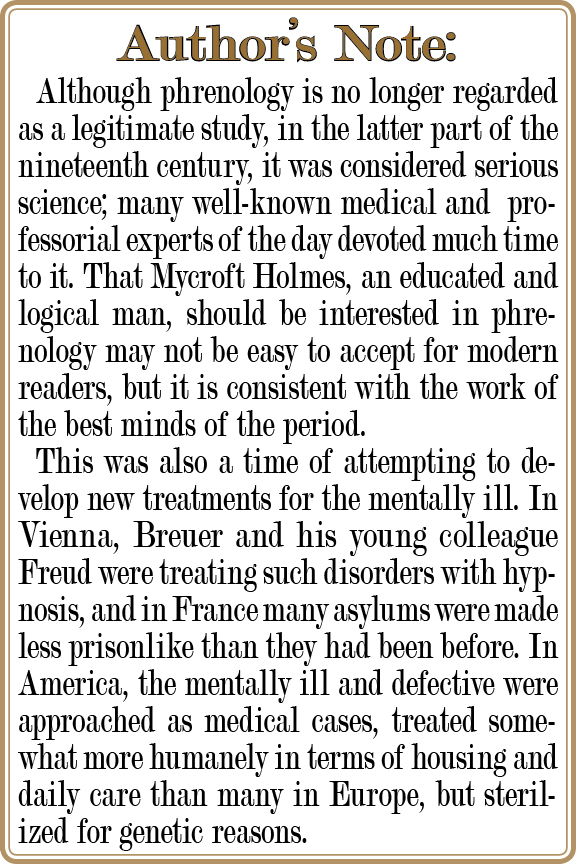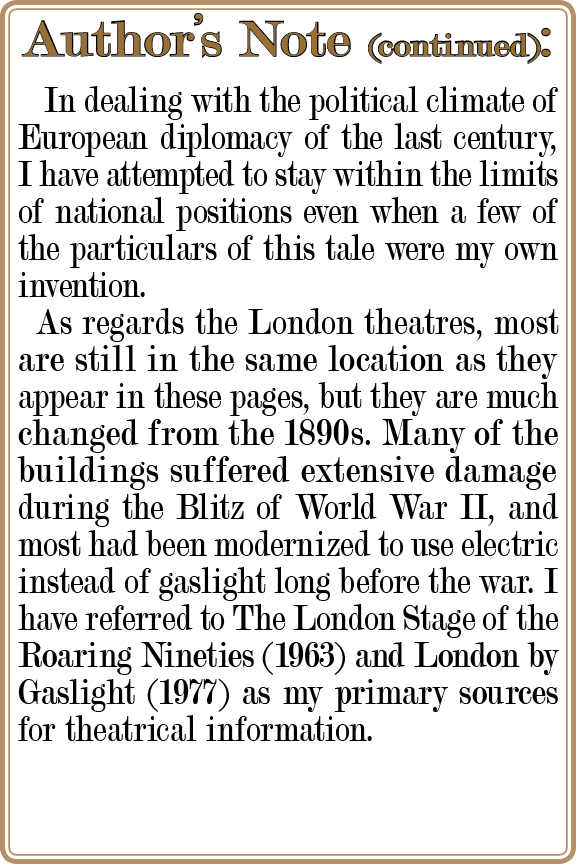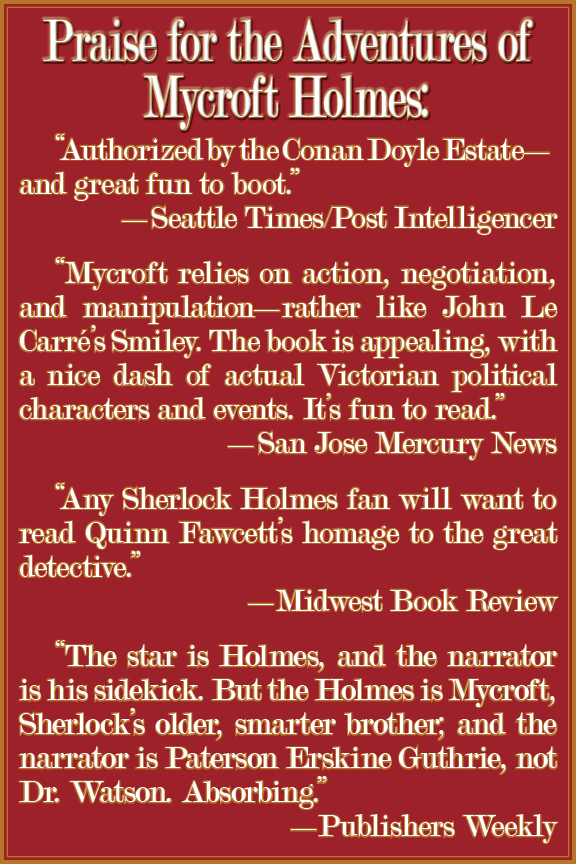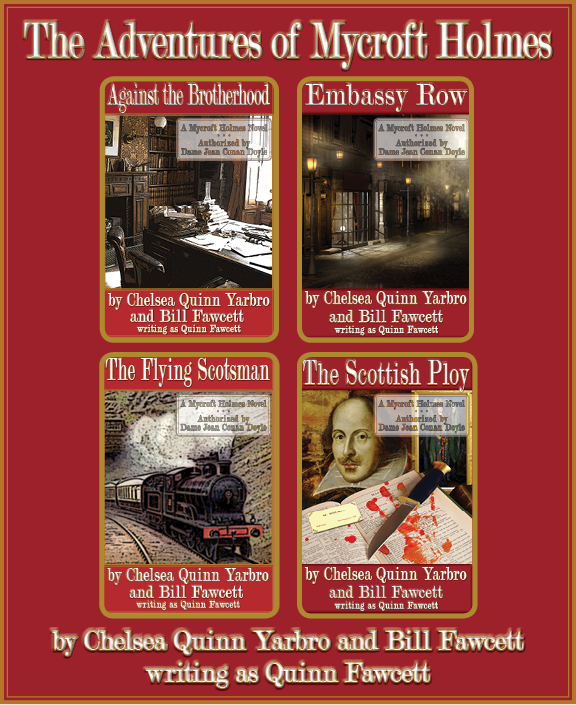The Scottish Ploy (30 page)
Authors: Chelsea Quinn Yarbro,Bill Fawcett
Tags: #Holmes, #Mystery, #plot, #murder, #intrigue, #spy, #assassin, #Victorian, #Yarbro


CHIEF INSPECTOR
Vaughn Pryce apologized for his visit. “I know I told you on Friday that I would not call again until Wednesday, but there have been developments.” He stood in the entryway brushing the snowflakes off his shoulders.
Mycroft Holmes was in the study door; I was a few steps behind him. It was very nearly noon on Monday, our first day attempting to return to our usual schedule of activities. “They must be significant, or you would only send a message round.”
“Yes, they are.” He handed Tyers his coat and came toward us.
“I reviewed Inspector Featherstone’s account with great interest; thank you for providing me a copy of it,” Holmes said by way of welcome.
Chief Inspector Pryce merely nodded his acknowledgement. “Do you mind if we talk this over confidentially?”
“My dear Pryce,” said Holmes. “You may say anything you like in the presence of Guthrie or Tyers. They will not carry a syllable of it beyond these walls.” He did not add that Sutton was asleep behind the closed doors of the withdrawing room; he stood aside and allowed Chief Inspector Pryce to enter the study. “Tell us what has transpired.”
Now that he was in the room, Pryce seemed unable to decide what to tell us. He paced the confines, and finally stopped in front of the shuttered windows. “I was called to a house in Hayes End, in Drayton Road. The local constabulary had discovered something that needed my attention, they said.” His distress grew more emphatic. “We found Sir Marmion Hazeltine—or most of him.”
“Gracious,” said Mycroft Holmes.
“He had been done to death most terribly,” said Chief Inspector Pryce. “I was very much shocked, and I am not easily put off trim.” He sat down in the nearest chair. “He appeared to have been the sacrifice in a blasphemous ritual. His hands and male parts were missing. So were his eyes.”
Holmes looked very somber. “There was a triangle carved in his chest? Enclosing a wound to the heart?”
Chief Inspector Pryce looked startled, and then sighed, nodding. “I thought you would know.”
“Why?” Holmes asked, troubled by this remark; I could see him reach for his watch-fob and begin to twiddle it.
“Because there was a note, and Sir Marmion’s journal. The note was addressed to you.” Chief Inspector Pryce bit his lower lip.
“Which said?” Mycroft Holmes prompted. “I am sure you have read it.”
“It said:
this round goes to you. The next is ours.”
The Chief Inspector’s voice sounded hollow, as if just speaking the words added to their weight on his mind.
“No signature, of course,” said Holmes.
“No,” said Chief Inspector Pryce. “But there was a long-barreled pistol of some kind holding down the note and the journal.”
“Oh, dear,” said Holmes, aghast, his voice dropping to a near-whisper. “So he thinks this was a game?”
“Apparently so,” said Chief Inspector Pryce. “Their aim appears to have been two-fold: one, to bring Sir Cameron MacMillian under the absolute control of his estranged wife; I cannot discern why.” He shot a suspicious glance at Holmes, whose visage gave away nothing. “The second was to distract you with as many demands on your attention as they could muster, to see if you would become lost in the tangle. The criminals involved apparently wanted to drive you to the limit so as to operate undetected, or so it would seem, given as much as I have to go on.” He looked down at his hands as he flexed his long, knob-jointed fingers. “Sir Marmion seemed to think you were kidnapped and held in his asylum.”
“Did he?” said Mycroft Holmes in a tone that revealed nothing whatsoever.
“Yes,” said Chief Inspector Pryce. “He planned to examine you under galvanic-shock, to force you to reveal all you know. Apparently this didn’t happen. This all was intended as preparation—I do not know for what.” He waited, hoping for some comment; he got none. “In any case, Sir Marmion’s failure to wring information from you caused his associates to ... to kill him.”
“He may have deserved the full judgment of the law, but he did not deserve slaughter,” said Holmes with utmost sincerity. “I should have preferred to see him hang.”
“Should it have come to that?” asked Chief Inspector Pryce.
“Oh, yes, I think so,” said Holmes as if discussing the change in the weather. “He was involved up to his neck, beyond doubt.”
“Involved in what?” Pryce demanded.
“Activities against Britain, and against her citizens.” It was all the answer Holmes was prepared to give. “If I were you, Chief Inspector, I would handle the evidence in this case most circumspectly. You have stumbled upon a significant record of villainy. It may prove embarrassing to many if it should become generally known.”
“Is that a warning or a threat?” Pryce was growing restive; he fiddled with his notebook.
“From me? A warning. I have nothing to fear from that book. Let them try to do their worst.” He stopped worrying his watch-fob. “But there are others who may not feel as I do, and some of them are influential.”
Chief Inspector Pryce sighed. “It may be time for me to retire,” he said. “I have money enough to last all my life long. I thought I could rectify some of the injustices I have seen through becoming a police officer, but I am not so sure anymore.”
I saw he was in dismay, and so I said, “If you have done some good, you have accomplished more than most.” It wasn’t much in the way of comfort, but it was the best I could offer; it was often all I had myself.
“Thank you, Guthrie,” said Chief Inspector Pryce with a sarcastic smile.
“Ta,” I replied.
Pryce looked back at Mycroft Holmes. “I don’t suppose we’ll ever find out who killed Helmut Kriede. The Germans won’t like that.”
Mycroft Holmes blinked in astonishment. “Why, my dear Chief Inspector, it’s patently obvious that Herr Kriede was the victim of his own poison.”
Chief Inspector Pryce favored Holmes with a bemused stare. “And how is it patently obvious?”
“Look at the accounts of Farbschlagen and Eisenfeld. Both men say that Kriede was agitated before Sir Cameron arrived. We already knew there was an agent of the criminal organization called the Brotherhood among the Germans—”
“And how did we know that?” asked Chief Inspector Pryce.
“Certain agents working clandestinely in Europe warned us of that possibility,” said Holmes, and did not elaborate. “Since it was not the Baron von Schattenberg himself, it had to be one of his aides. Kriede must have had instructions to poison Sir Cameron, and had applied the poison to the top cup, knowing it would be given to Sir Cameron. His nervousness was the result of having already put the poison in place. Having done that, he could not refuse to drink the tea without exposing himself to the very kind of discovery he dreaded. So he drank his own poison rather than betray the Brotherhood.”
“If Sir Marmion is any indication of how they treat their traitors, I might have done the same and drunk the poison,” said Pryce.
“Precisely what Kriede must have thought,” said Mycroft Holmes. “We may never be able to prove it in a court of law, but I am satisfied on that point, just as I am satisfied that Vickers has escaped again.” This last admission did not please him, and he frowned ominously. “If he intends to continue this so-called game of his, he will be back. And I will have him.”
Chief Inspector Pryce shook his head. “I don’t want to know any more about it.” He rose. “If you have any suggestions as to what I might tell the Baron regarding Kriede?”
“Certainly: tell him that Helmut Kriede was the victim of an attempt on Sir Cameron’s life. It is, as far as it goes, the truth.” Mycroft Holmes held out his hand. “You have been very diligent, Chief Inspector. It would be a shame if Scotland Yard were to lose you. Give me your word you will think over your retirement for at least a week before coming to a final decision.” He held out his hand.
Pryce took it. “All
right; I will give it a week.” He started toward the door. “I may have to call upon you again.”
“I look forward to it,” said Holmes as Tyers appeared to usher Chief Inspector Pryce out the door. When he was gone, Holmes looked back at me. “This is a bad business, Guthrie. Vickers will be out for vengeance now.”
“Hasn’t he always been?” I asked.
“Yes, of course. But he has failed on two crucial points, and the Brotherhood will not reward him for that. So it follows he will want to exact a price for his chagrin.” Mycroft Holmes stood staring into the middle distance. “He surely holds me responsible for his defeat. The Brotherhood will not tolerate another such debacle on his part, so he will have to annihilate me in order to remain one of their number.”
I felt a cold chill go through me at his choice of words, and my recollection was nudged. “You never did tell me how you escaped from the Brotherhood once they found you out,” I reminded him.
“I didn’t, did I?” said Holmes. “Well, that is more Tyers’ story than mine. You must ask him about it one day.” He returned to his seat and began to read over the latest dispatch from the Admiralty when Sutton strolled into the room.
“Good morning,” he said genially. The bruises were fading from his face, leaving his complexion a greenish-yellow shade that not even Sutton could make appear suitable. “You’ve been entertaining the police again, I hear.”
“Yes,” said Holmes. “He was helping us tidy up some loose ends from last week.”
Sutton gave a single nod of his head. “Loose ends. You might well call them that,” he said seriously. “Shakespeare has something to say on that head.”
Mycroft Holmes shot him a warning look. “If you mean to quote
MacBeth
to me, I may throttle you.”
“No, no; I’ve done with the Scottish Play,” said Sutton. “I had another in mind.”
Knowing one of us would have to ask, I said, “Which one?”
Sutton beamed. “Why,
All’s Well that Ends Well,
of course.”




